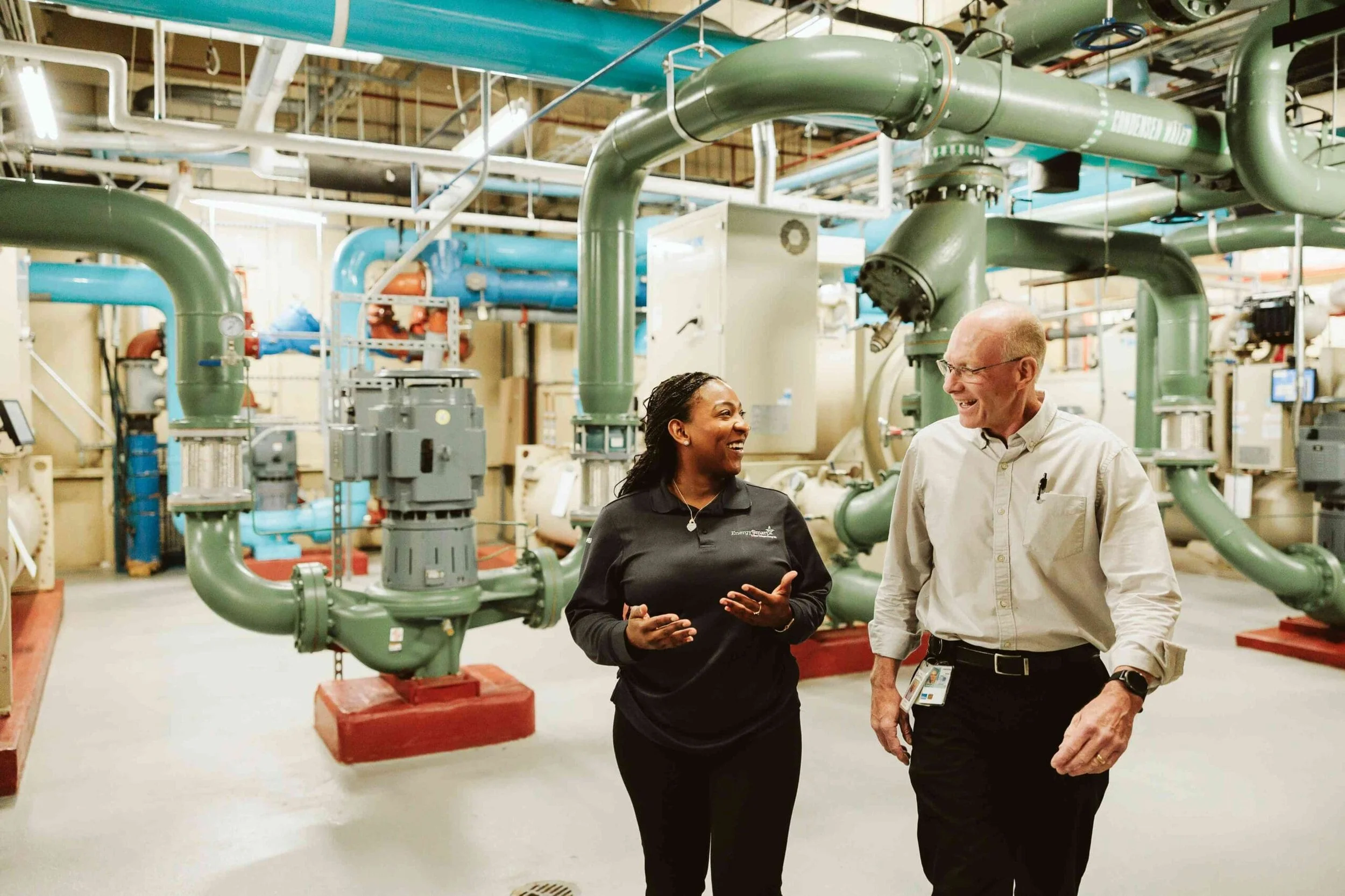
Sustainable Healthcare
Get a Free Impact Consultation
Care That Lasts:
The Power of Sustainable Healthcare
The healthcare sector is responsible for between 7.9 percent and 9.8 percent of national greenhouse gas emissions in the US according to the Commonwealth Fund. As more and more Community Health Needs Assessments (CHNAs) reveal the need for environmental protections against major heat events, sudden flooding, and other climate-related health impacts, sustainability, resilience, and community benefits work begin to merge. Furthermore, your CHNA may also identify equity goals that your team can further support through a smart sustainability strategy.
Here are a few reasons to consider sustainability at your healthcare facility:
Protecting public health beyond the clinic: sustainable healthcare exists to improve health, but traditional practices can generate pollution, greenhouse gases, and hazardous waste that harm the same communities they aim to serve. For example, poor waste management can lead to air and water contamination, which contributes to respiratory diseases and other health problems.
Reducing environmental impacts, reinvesting savings in care: the healthcare sector consumes massive amounts of energy, water, and single-use materials. Sustainable healthcare prioritizes implementing energy-efficient systems, water conservation measures, and waste reduction strategies that lower the sector’s carbon footprint, while also reducing operational costs over time. Savings can be redirected toward patient care, staff training, or facility upgrades.
Meet regulatory and accreditation requirements: sustainable healthcare meets and prepares your organization for increasing environmental and waste management regulations, which are becoming stricter in many countries. Other certifications from the Joint Commission and Practice Greenhealth can also be met through these strategies. Sustainability measures can keep facilities compliant and improve scores in hospital accreditation systems that increasingly evaluate environmental performance.
Improve your reputation and patient trust: Patients, employees, and communities increasingly expect healthcare providers to operate responsibly. Sustainability commitments can enhance a hospital’s image as a leader in both health and environmental stewardship.
Resilience and emergency readiness: Sustainable healthcare facilities—such as those with on-site renewable energy or efficient supply chains—are better prepared to continue operations during crises like natural disasters or supply shortages.
10%
nearly 10% of national greenhouse gas emissions in the US can be attributed to the healthcare industry.
Sustainability Dashboard for the Healthcare Industry
LifeCity partners with the healthcare industry to provide a sustainability dashboard that aggregates your data and helps your sustainability team manage results across departments and goals. Whether you are working within a sustainability, facilities, or community benefits teams, our consultants can provide both the tools and strategy to help reach targets, cut costs, and improve customer and employee satisfaction.
We typically begin our work by examining energy and waste assessments or audits, in addition to reprocessing single-use waste and examining pharmaceutical waste reduction. Our team can work with you and your partners to establish baseline energy and waste efficiency outputs and through our assessment identify best practices for improvement. As a sustainability consultant, we can also help your organization make strategic decisions leveraging best practices like transition from central nitrous oxide systems, to portable systems.
Our Holistic Approach to Sustainable healthcare
What makes our consulting services unique is that we take a holistic approach that recognizes the connection between human, environmental, and community health goals. Sustainability changes often come down to behavioral change and we understand both the technical and psychological aspects that are necessary for success. Sustainable healthcare, afterall, is more than simply putting out recycling bins, it’s helping develop a culture of sustainability where staff place items in the proper bins.
This is ultimately about behavioral change and it is an opportunity to remind staff that your hospital cares for them and the planet. Our process can identify opportunities that don’t just help the environment and create community benefits related to equity and climate mitigation, but also support staff productivity and retention. Our goal is to help you reduce, prevent, and ultimately eliminate pollution at its source—while advancing workforce development and delivering cost savings through our holistic process.
Increase Purpose & Job Satisfaction
Many healthcare professionals, especially younger generations, are concerned about environmental issues and seek employers whose values align with their own commitment to addressing climate change and promoting a healthier planet. Working for a sustainable hospital can provide a greater sense of purpose and job satisfaction, therefore, hospitals with robust sustainability commitments will attract the best talent.
An example of our holistic framework can be found in our work with the sustainability team at Ochsner Health System. Through a waste audit at their largest campus, we identified almost 1M in savings through behavioral changes that would result from increased cardboard recycling, improved bin segregation management (through training and signage), and stronger employee retention. Hospital staff, especially staff that are dedicated to removing hazardous waste, are often people of color. The inherent connection between equity and sustainability can be found in this common challenge of employee retention and proper waste management. We believe that every challenge is truly an opportunity for healthcare systems to address both climate and equity concerns discovered in Community Health Needs Assessments, and further support smart, resilient best practices that save costs and achieve sustainability goals.

A healthy environment is the foundation of healthy lives —sustainability in healthcare is not an option, it’s a responsibility.
OUR IMPACT
True sustainability is rooted in community. Our impact goes beyond carbon metrics. We help organizations understand how their actions affect the people and places they serve. By combining environmental strategies with social equity goals, we support businesses in creating measurable changes that improve lives, strengthen local economies, and respect the unique needs of each community. From reducing waste to amplifying stories of impact, we’re building a more just and sustainable future: one neighborhood, one organization, one initiative at a time.
1M+
IN FINANCIAL SAVINGS
INNOVATIVE SOFWARE SOLUTION
1
1
UNIQUE WASTE ASSESSMENT PROCESS

“LifeCity's sustainability dashboard helps teams and departments track progress and demonstrate measurable improvements, clearly showing the impact of our efforts in one place. Its impact storytelling features bring data to life, making it easier to communicate successes and build the case for continued investment in sustainability and community benefit projects by highlighting real results and ongoing momentum.”
- Jessica Diedling, Community Benefits & Sustainability, Ochsner Health
Schedule a Meeting With One Of Our Consultants
Are you interested in simplifying and streamlining your sustainability journey? Leverage a LifeCity consultant to help your sustainability team leverage results.
CASE STUDIES
OCHSNER HEALTH SYSTEM
YMCA PRESCOTT VALLEY
ENERGY
SMART

INSIGHTS

SUSTAINABILITY NEWSLETTER
Join our newsletter to get fresh insights and stories on driving social and environmental impact. Stay connected and be the first to hear about tools, resources, and opportunities.









